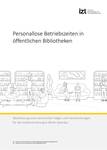Unstaffed operating hours in public libraries
Abstract
This report offers an introductory presentation of the concept of staff-free opening hours in public libraries and gives an assessment of the socio-technical consequences on the basis of our own surveys and the scientific studies. Based on this, guidelines and recommendations for an implementation in Berlin-Spandau are formulated. By means of staff-free opening hours (the term Open Library is also used synonymously), visitors are enabled to use the library services at certain times in the absence of staff. The concept, which is technically based on electronic access systems in combination with self-checkout machines and video cameras, creates the conditions for a significant expansion of opening hours without resorting to additional staff resources. In a growing number of libraries in Germany and abroad, staff-free opening hours are already firmly integrated into the service offer; especially in suburban and rural areas, they are seen as an opportunity to increase the attractiveness of the offer. However, expectations of the concept are marked by controversy. Above all, the impact on the number of employees as well as the issues of data protection, security and social accessibility are at the centre of the discussions. Taking into account the results of scientific studies, a predominantly uniform picture can be drawn with regard to the socio-technical consequences: staff-free opening hours are primarily used to create an additional offer beyond the previous opening hours and are generally well accepted by the users. In many places, scepticism is prevalent among the staff, although this is mainly observed before the implementation of the service extension and decreases afterwards. Increases in the number of property damage, theft or similar incidents are generally not recorded. Likewise, technical and organisational possibilities are available in principle to comply with applicable data protection regulations. In principle, however, the socio-technical effects depend on the concrete manner of implementation, which, in addition to the area of technical measures, also includes structural-architectural and organisational aspects in particular.
